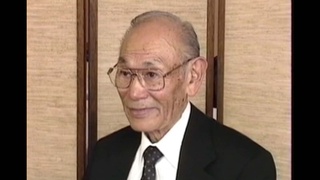Interviews
Fun at concentration camp
I was so young that all we did…they just let us play wherever we wanted to do. So that’s what we did. We just roamed all over camp and embarrassed my father. Because he was the fire watch for that block and we set the water tank on fire accidentally, playing with matches. But that’s all I remember -- it was a lot of fun.
I remember eating separately by age and by sex. So that to this day, I think my generation really has trouble eating together as a family. It’s just a habit from that time, you know. We never…my mother never cooked lamb because every Friday was lamb stew – mutton stew – at the cafeteria and it’s that…mutton is that really oily…you know, so she would never. So I didn’t discover lamb until college.
Date: December 3, 2004
Location: California, US
Interviewer: Art Hansen, Sojin Kim
Contributed by: Watase Media Arts Center, Japanese American National Museum
Explore More Videos

Choice to move east or go to Japan
(b.1920) Japanese Canadian Nisei. Established the Ikenobo Ikebana Society of Toronto


Institutionalization as a bad aspect of camp
(1924-2018) Researcher, Activist

State Department records show concern for treatment of Japanese American internees
(1924-2018) Researcher, Activist

Remembering December 7, 1941
(1923-2011) Lawyer, MIS veteran, founder of Francis and Sarah Sogi Foundation

Meeting Japanese Americans from the mainland in MIS
(1923-2011) Lawyer, MIS veteran, founder of Francis and Sarah Sogi Foundation

Awareness of concentration camps as a Japanese American
(1923-2011) Lawyer, MIS veteran, founder of Francis and Sarah Sogi Foundation

Manhunt
(1919 - 2005) Challenged the constitutionality of Executive Order 9066.

The Final Verdict
(1919 - 2005) Challenged the constitutionality of Executive Order 9066.


Reaction to a 1942 speech by Mike Masaoka, Japanese American Citizen League's National Secretary
(1915 - 2011) Nisei florist who resettled in New York City after WW II. Active in Japanese American civil rights movement


Reasons for conformity and competitiveness in Gardena, California
(b. 1946) Lawyer

Role of the redress movement in helping Nisei to open up about their wartime experiences
(b. 1946) Lawyer

Search of family home by the FBI following the bombing of Pearl Harbor
(1937 - 2021) Teacher
